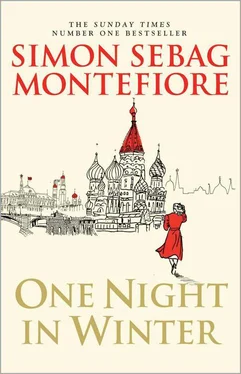‘It’s a gramophone from RCA, America,’ said George. ‘It can play the discs one by one – and isn’t the sound beautiful?’
‘It’s not bad,’ Andrei said, absolutely dazzled by what he was seeing.
‘And this has just arrived.’ George was pointing at a bizarre glassy tube set in another elegant wooden cabinet.
‘What a weird contraption. What is it?’
‘That’, said George, ‘is a machine called an iconoscope – or a television – and it shows a picture…’
‘Really? But how—’
‘Come on.’ Andrei could hear the sound of laughter, sizzling food and clinking cutlery as they ran through into a huge kitchen, where the Satinov family sat at a mahogany table while Leka, the maid, was juggling at least three steaming pans on the stove.
‘Andrei Kurbsky!’ His English teacher, Tamara Satinova, George’s fine-boned stepmother, was shaking his hand. ‘You’re the new boy in my English class. Come on in and have some khachapuri .’
Andrei’s eyes widened at the steaming Georgian dish, somewhere between a pizza and a cheesecake, and the sheer quantity of other food on the table in front of him.
‘We eat a lot of Georgian food here. Here’s lobio – bean soup – and this is chicken satsivi… ’ Andrei did not want to admit he had never tried such things but Tamara seemed to understand this, and made him feel so at home that he started to help himself.
A young man in air force uniform with the gold star of the Order of the Red Banner on his chest sat at the head of the table. ‘Aha, George’s new friend,’ he said, shaking his hand. Andrei knew this was Major David Satinov, newly returned from the war. He almost bowed before this heroic pilot who had been shot down and wounded.
Mariko, the six-year-old, was sitting on her mother’s knee, holding a toy dog.
‘Leka, would you make Mariko a hot chocolate?’ asked Tamara.
Mariko was tiny and dark with her hair in braids woven over the top of her head. ‘Meet my dog,’ she said to Andrei, holding up the shaggy toy, a black Labrador. ‘Stroke her fur. Isn’t she silky? I run a school for female dogs called the Moscow School for Bitches. Today they’re studying Pushkin like all of you.’
‘Ah, Andrei,’ said Tamara. ‘You should know that if you enter this home, you have to embrace Mariko’s School for Bitches! But now, quiet, darling, I’m listening to your big brother.’
‘Well, these new planes turn well,’ said David, ‘but there’s a problem with them…’
‘Don’t say another word about that,’ said Tamara with uncharacteristic sharpness.
There was silence. They were all aware that men had been arrested and shot for criticizing Soviet technology.
‘But everyone in the air force is talking about it,’ David protested.
Tamara glanced at Andrei, the outsider, as Losha Babanava strode into the kitchen. ‘The big man’s home!’ he said.
The gaiety vanished, and the air changed, as it does when snow is imminent. All the boys stood up sharply: the power of the Soviet State had entered the room in tunic and boots, with a spareness of emotion and economy of movement. Taut as a bowstring, his hair razor-cut and greying at the temples, Comrade Hercules Satinov greeted the children as if he was reviewing a regiment.
Each of the boys kissed their father thrice: ‘Hello, Father,’ they said formally. Satinov took Mariko into his arms, lifted her high and kissed her forehead.
Andrei was captivated by his presence, and terrified. He imagined the deeds of Satinov’s long years with Stalin: the struggle with Trotsky, the war against the peasants, the spy hunt of the Terror, the war. What secrets he must know; what things he must have seen. He personified tverdost , hardness: the ultimate Bolshevik virtue. Only when he kissed Tamara and rested his hands on her hips did Andrei glimpse the sort of warmth that he remembered seeing between his own parents.
‘How was school, Tamriko?’ Satinov asked her.
She sighed. ‘As always, too many papers to mark,’ she said. ‘Do you need anything? Coffee?’
Satinov’s grey eyes examined Andrei. ‘And who’s this?’ he asked George, who took Andrei’s arm and pushed him forward.
‘Father, this is my new friend Andrei Kurbsky from school. He’s just arrived.’
‘Just arrived?’ said Satinov sharply.
‘From Stalinabad. For the last term.’
Satinov took Andrei’s hand. The grip was tight and dry as a saddle. ‘Stalinabad? What’s the name again?’
‘Kurbsky.’ Andrei could almost hear Satinov’s bureau of a mind flicking through an index of files marked ‘Central Committee. Top Secret.’ What if he asked questions about his father?
‘You’re always welcome here, Andrei,’ said Satinov at last.
‘Thank you, Comrade Satinov.’
Satinov looked him up and down. ‘What do you want to do for your motherland?’ he asked.
Everyone went silent.
‘He’s going to be a professor. He really knows his Pushkin,’ George broke in. ‘He’s going to the top of the class.’
Satinov frowned. ‘So he’s another of your cloud-dwellers, George? At your age, I had no time for literature. I was a revolutionary. Pushkin’s a symbol of our national greatness, of course, but why study him?’
‘Because Pushkin teaches us about love,’ insisted George. ‘We need food and light scientifically – but none of it matters without love.’
‘For God’s sake, George! What nonsense. We created the first socialistic state. We fought our enemies in a battle of survival – and we’ve won. But the Motherland is ruined. Starving. We need to rebuild. We don’t need poetasters but engineers, pilots, scientists.’
‘Yes of course,’ agreed Andrei.
Satinov took out a cigarette – and Losha jumped forward to light it; he then saluted and withdrew. ‘David, how’s the new plane?’
‘Flying well, Father.’
‘Good. Well, I’ll leave you to your poems, boys.’ He nodded at Andrei, then he said curtly to his wife: ‘Tamriko?’
She followed him out of the room, and the barometer in the room rose again.
‘Father has something to tell her,’ explained George as he led Andrei back to his father’s little study with the gramophone. He closed the doors, restarted the jazz records and lay down on the sofa with his legs crossed. ‘They whisper in the bathroom. He never tells us of course. The less we know the better. Now he’ll have a nap for a few hours, and then probably he’ll be summoned very late for dinner.’
‘You mean—’
‘Don’t say the name, you fool,’ said George, pointing heavenwards. Then he whispered, ‘If you work for Stalin, you call him the Master but never to his face. In documents, he’s Gensec for General Secretary. The generals call him “Supremo”; in the Organs, it’s “the Instantsiya”. And when anyone says “the Central Committee”, they mean him .’
‘So he’ll be having dinner in the Kremlin?’
George sat up. ‘Don’t you know anything? He works at the Little Corner in the Kremlin but he really lives in the Nearby Dacha outside Moscow where my father and the Politburo meet late into the night over dinner. Then my father has to change and shave and be back in his office first thing in the morning. We hardly see him.’
‘He was at the fall of Berlin, wasn’t he?’
‘Oh yes, and at Stalingrad,’ said George proudly. ‘Now the war’s over, Father says he wants to see more of us – which means taking us to school, with all the bowing and genuflecting that entails. Pure hell! But no one tells my father what to do. No one except…’ And he pointed towards heaven again: Stalin.
‘I’d better be getting home,’ said Andrei. ‘My mother worries.’
Читать дальше












